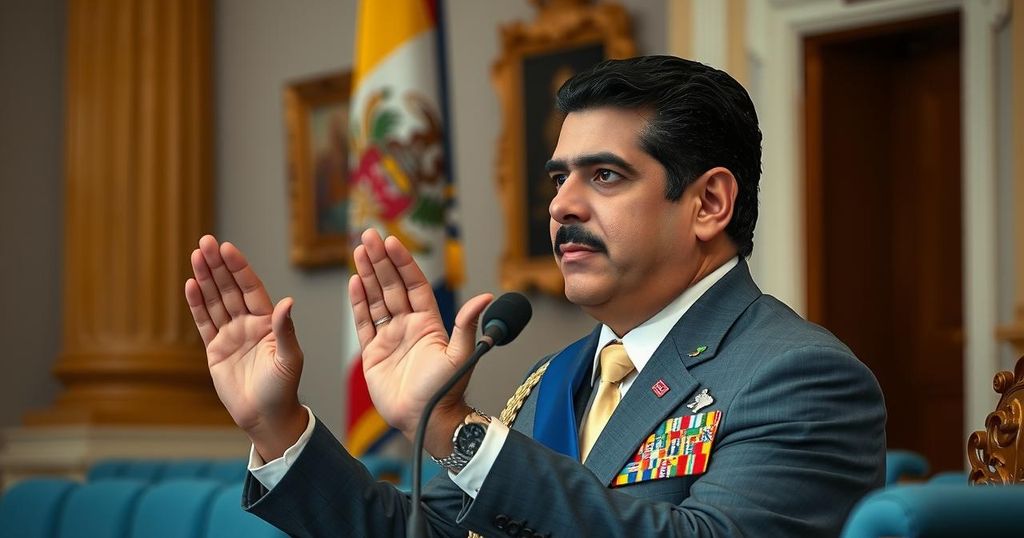Nicolás Maduro Sworn In for Third Term Amidst Claims of Electoral Fraud

Venezuelan President Nicolás Maduro was sworn in for a third term, despite credible evidence suggesting his opponent won the recent election. The inauguration was met with widespread protests, further exacerbated by the government’s harsh crackdown on dissent. International bodies, including the EU and the U.S., have imposed sanctions on key officials citing threats to democracy. The contentious political climate highlights ongoing tensions and raises concerns over human rights violations in Venezuela.
CARACAS, Venezuela — On Friday, Venezuelan President Nicolás Maduro was inaugurated for a third consecutive six-year term, extending his presidency until 2031 amidst widespread protests and credible indications of electoral loss to his opponent. During the ceremony held in a heavily secured legislative palace, Maduro delivered a zealous speech insisting that external threats, notably from the United States, could not deter his government. He proclaimed the event a significant victory for Venezuela, affirming, “Today more than ever I feel the weight of commitment, the power that I represent, the power that the constitution grants me.”
The opposition has asserted that after the July 28 election, its representatives collected and published data from over 80% of electronic voting machines, indicating that Edmundo González secured twice as many votes as Maduro. Observers from the U.S.-based Carter Center corroborated these findings, deeming the alternate tallies legitimate. In response to the controversial election, the European Union imposed sanctions on fifteen prominent Venezuelan officials who they claim jeopardized the nation’s democratic process. The U.S. Treasury Department also announced additional sanctions aimed at Maduro’s administration, including key officials of state-owned entities and ministries.
Simultaneously, tensions escalated as anti-Maduro protests erupted in the capital, Caracas. Prominent opposition leader María Corina Machado, who had been barred from running for office, faced brief detention during the protests. Machado’s aides reported that she was coerced into issuing video statements amid escalating dissent. Leaders from across the Americas and Europe condemned the government for stifling opposition voices, with U.S. President-elect Donald Trump expressing his firm support for Machado and González, declaring, “These freedom fighters should not be harmed, and MUST stay SAFE and ALIVE!”
As Maduro’s supporters celebrated his inauguration outside the venue, the political atmosphere remained charged with allegations of electoral fraud and violent repression of dissent. The absence of detailed vote counts following the election heightened international scrutiny and prompted the ruling party to seek judicial approval of the results. Nonetheless, the government’s response to protests has been brutal, resulting in many arrests and reported instances of violence. Though Maduro has taken the oath of office, the ongoing conflict demonstrates deep divisions within Venezuelan society and a concerning trajectory for the nation’s political future.
The recent inauguration of Nicolás Maduro takes place within a context of political turmoil in Venezuela marked by allegations of electoral fraud and a significant crackdown on dissent. The claims by the opposition regarding vote tallies and the lack of detailed electoral results following the July 28 election contributed to international alarm over the legitimacy of the election process. The government’s infamous handling of protests has further compounded allegations of authoritarianism, breeding dissent among Venezuelans. Moreover, recent sanctions imposed by the European Union and the United States underscore concerns regarding democracy and human rights in Venezuela. The opposition’s insistence on credible evidence of electoral defeat invites scrutiny into the political dynamics that enable Maduro’s continued reign amid widespread opposition unrest.
In summary, Nicolás Maduro’s inauguration for a third term underscores the ongoing political crisis in Venezuela, characterized by claims of fraudulent elections and significant repression of dissent. The international community, through sanctions and condemnation, has signalled its disapproval of Maduro’s governance tactics. The situation remains perilous as opposition figures continue to face intimidation, illustrating deep societal divisions and raising questions about the future of democracy in Venezuela.
Original Source: www.newsday.com







